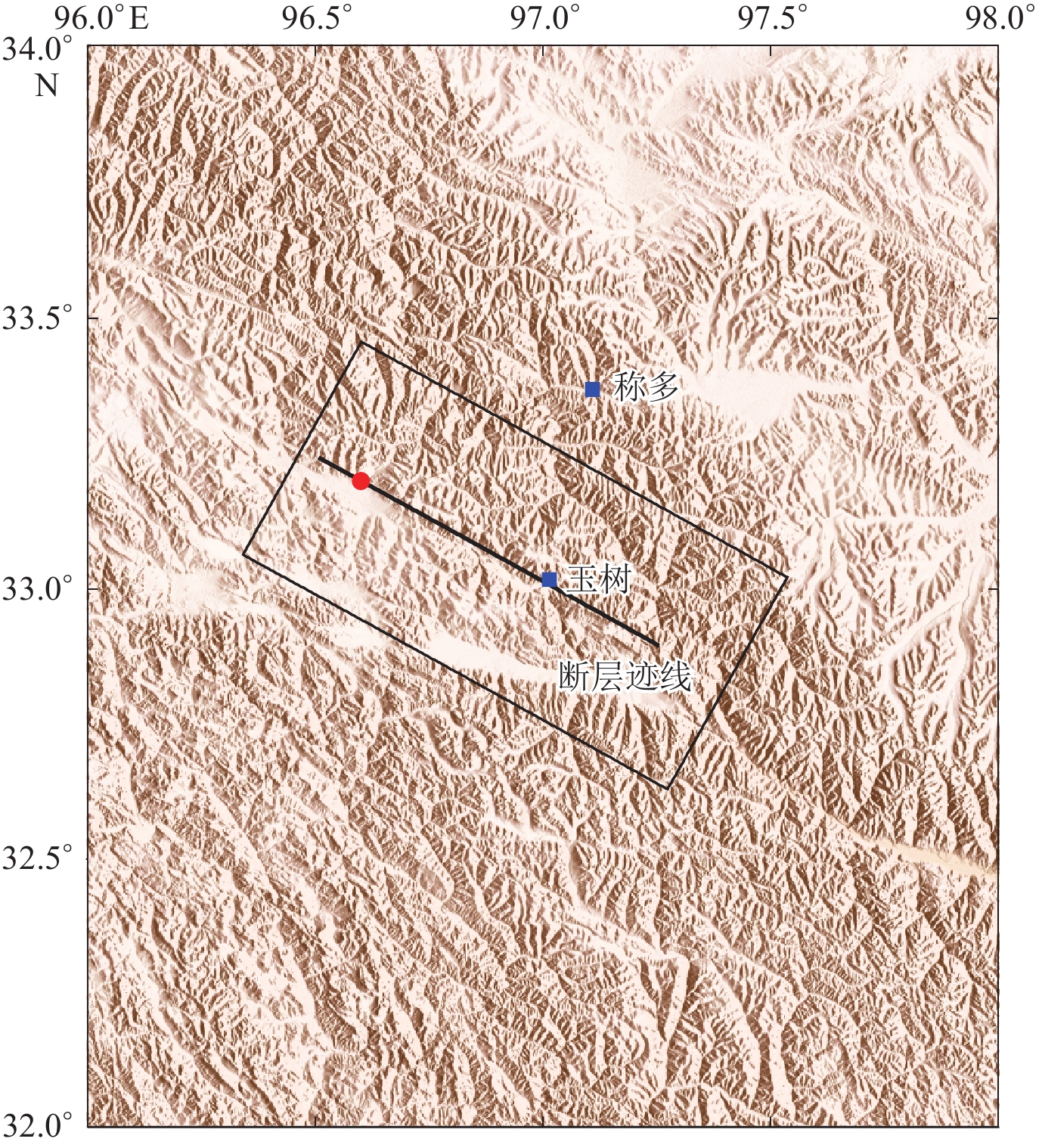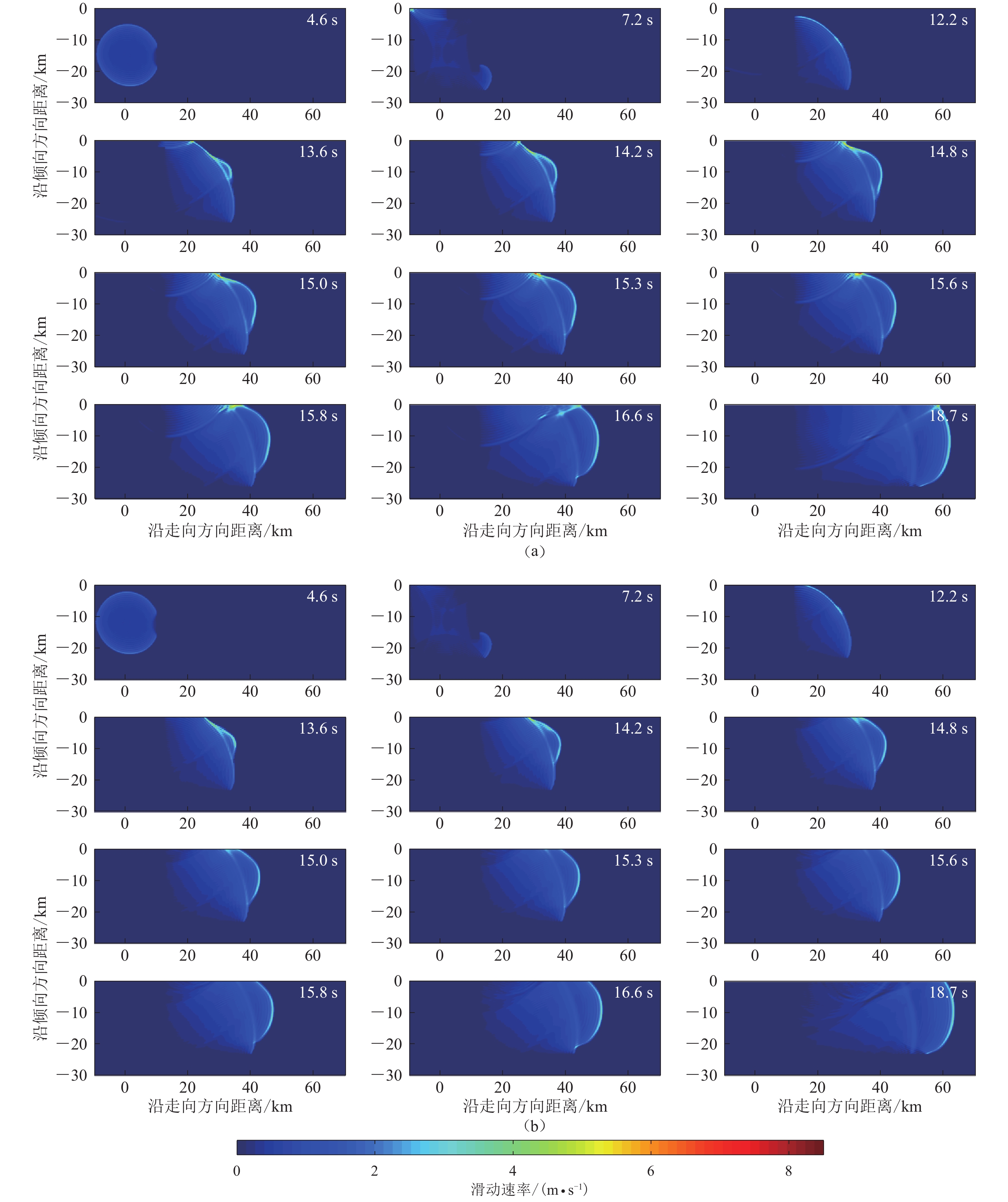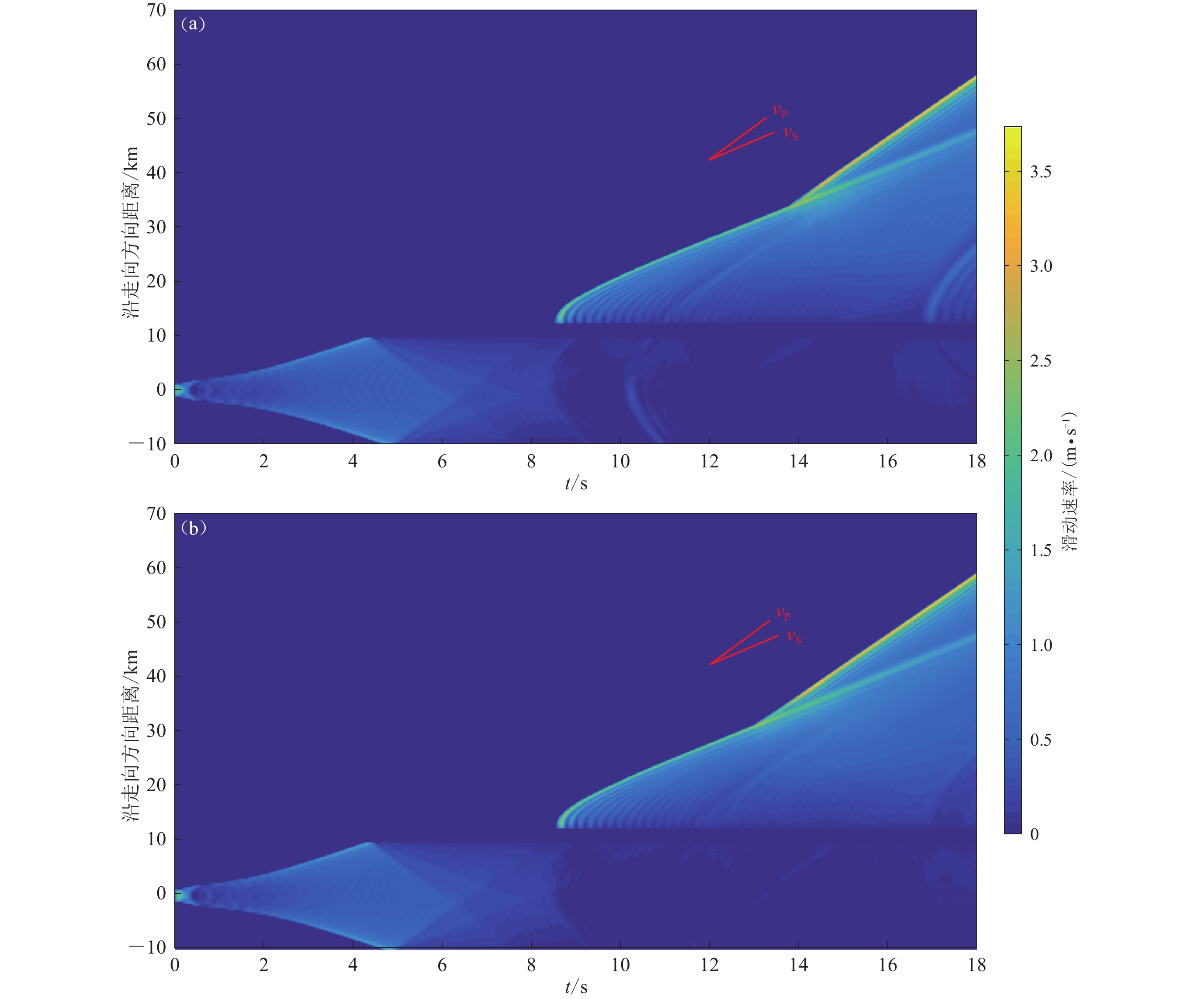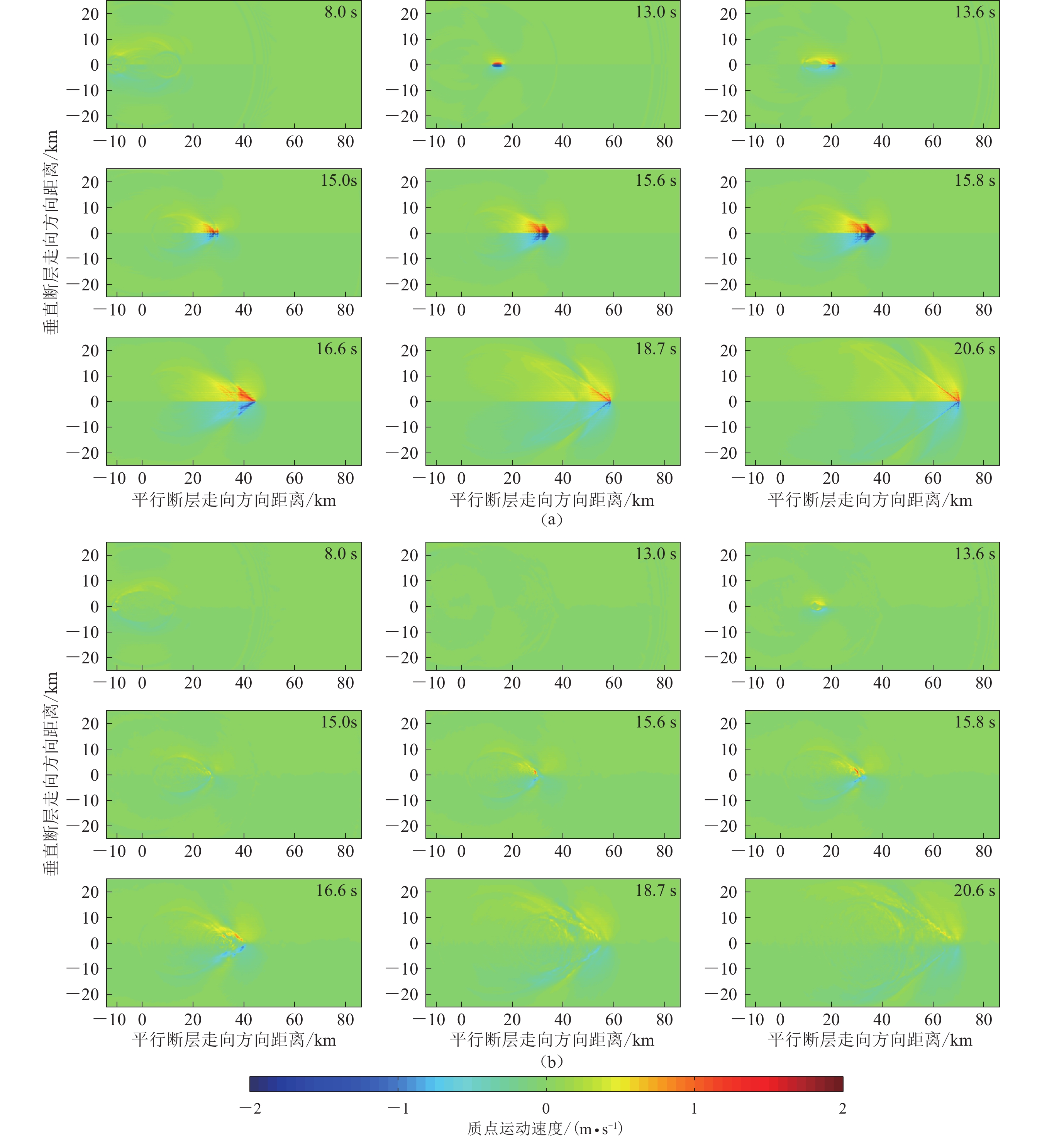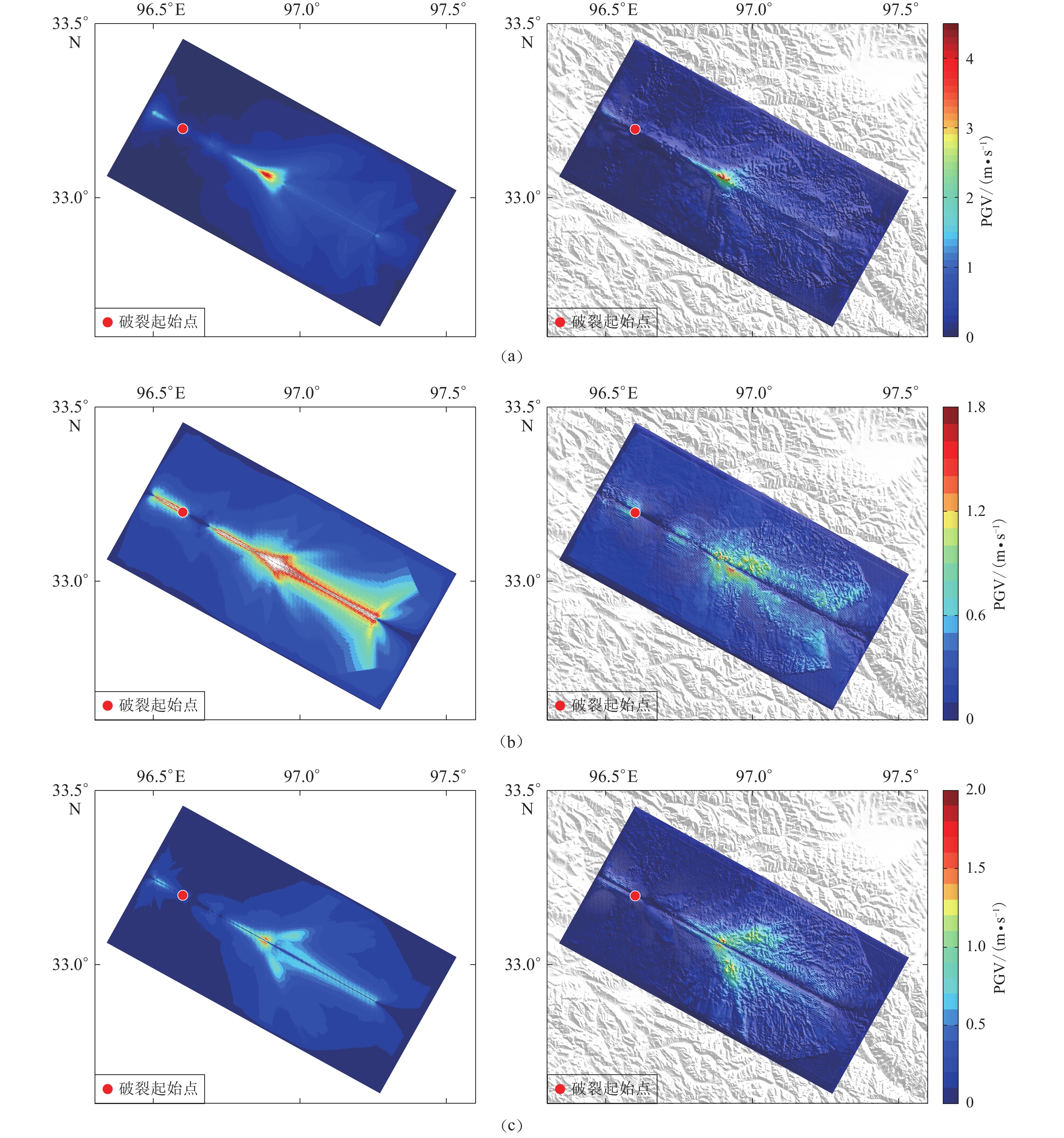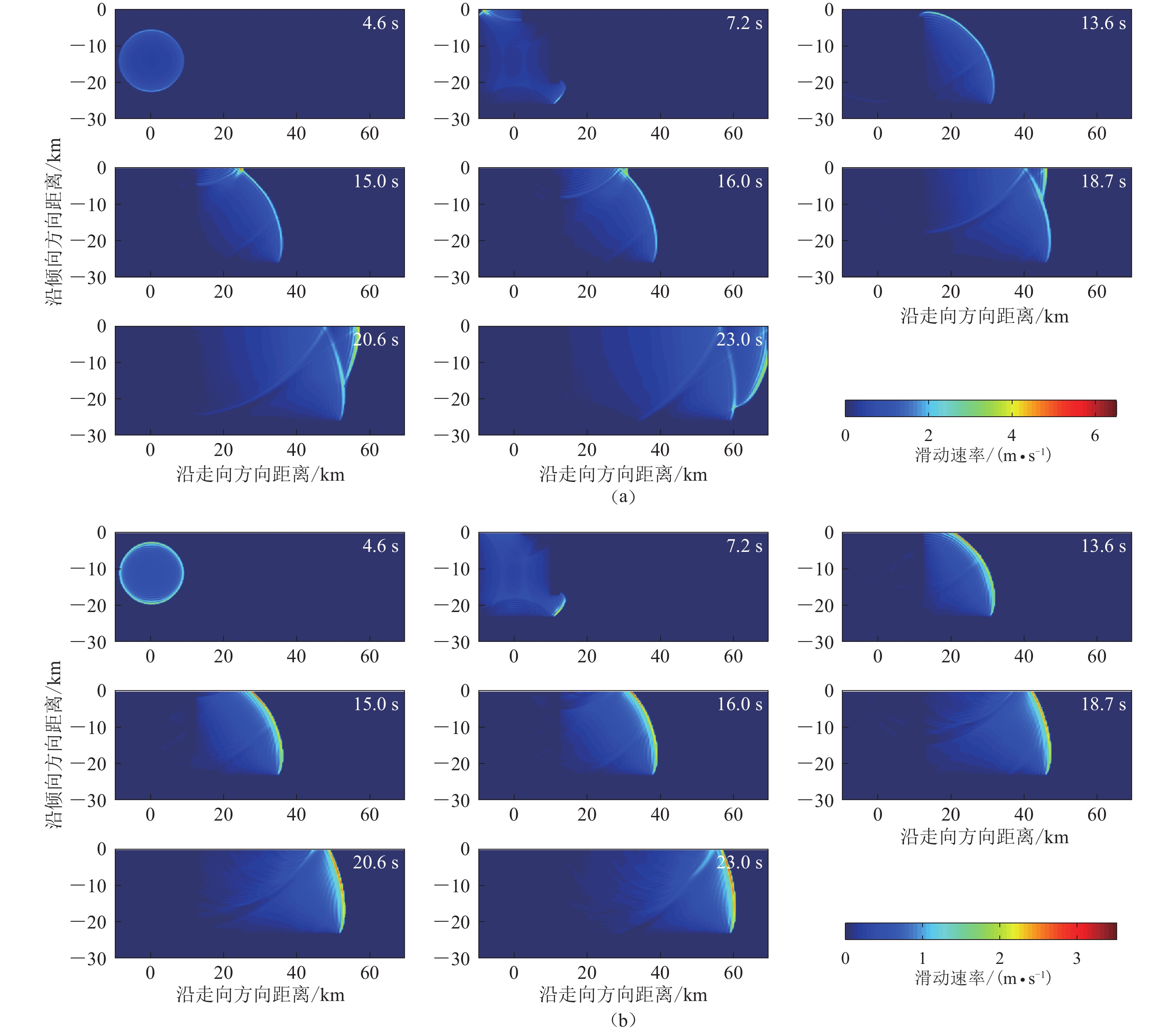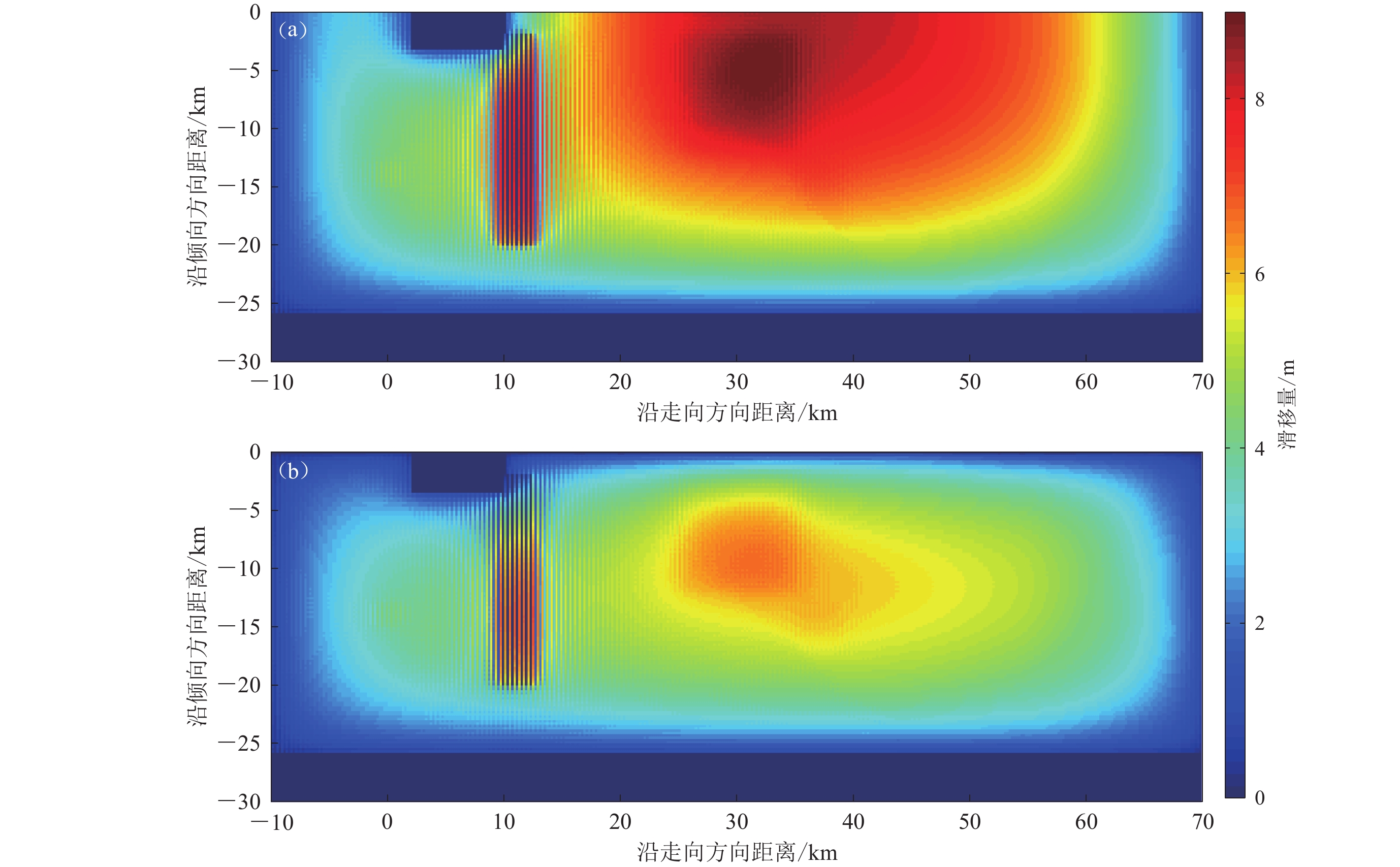Influence of actual topography on the source dynamic rupture process and strong ground motion of the 2010 Yushu MS7.1 earthquake
-
摘要: 基于震源动力学模型,采用曲线网格有限差分法模拟了水平自由地表及实际地形条件下2010年玉树MS7.1地震的震源破裂过程及相应的地面地震动,获取了断层面上的破裂传播过程、最终滑移量分布及峰值地面速度分布,讨论了实际地形对玉树地震破裂过程及相应地震动的影响。基于本文设定的动力学模型,模拟结果显示:断层面上的高应力降是玉树地震出现超剪切破裂传播现象的主要原因;计算区域的实际地形阻碍了由自由地表引起的超剪切破裂的产生,对断层面滑移量的分布特征及滑动速率影响较大,进而在一定程度上降低了地震动峰值,同时对地震动的分布特征产生影响,且地震动平行断层面的水平分量相对受影响更大。Abstract: Based on the source dynamic models, the curved grid finite-difference method was implemented to simulate the dynamic rupture process and the resultant ground motions of the 2010 MS7.1 Yushu earthquake with horizontal free surface and actual topography respectively. Then the rupture propagation, final slip distribution and distribution of peak ground velocity were obtained to investigate the effect of actual topography on the dynamic rupture process of the Yushu earthquake and the resultant strong ground motions. Based on our models, the results show that the super-shear rupture occurred during the rupture propagation process, which was mainly induced by high stress drop on fault plane. The actual topography has prevented the generation of super-shear induced by free surface and has a great influence on the final slip distribution and slip rate on fault plane, then will affect the characteristics of ground motions as well as reduce the peak values of ground motions to a certain extent. The fault-parallel component of ground motion is relatively more affected. The investigation about the fault rupture dynamics will help us to understand well about the source rupture process and explain the characteristics of its strong ground motions, which is of great significance to more reasonably predict the ground motions of possible destructive earthquakes in the future.
-
-
图 8 水平自由地表模型(模型Ⅰ,左侧)和实际地形模型(模型Ⅱ,右侧)中峰值地面速度三分量分布
(a) 垂直于断层面的水平分量;(b) 平行于断层面的水平分量;(c) 垂向分量
Figure 8. Three components of peak ground velocity distribution for horizontal free surface model (model Ⅰ ,left) and actual topography model (model Ⅱ ,right)
(a) Fault-normal component;(b) Fault-parallel component;(c) Vertical component
表 1 断层面上各区域应力参数
Table 1 Stress parameters for the areas on fault plane
区域 初始剪切
应力$ {\sigma }_{0} $ 
剪切破裂
强度${\sigma }_{{\rm{u}}}$ 
临界滑动弱化
距离Dc/m1 1.01 1.0 0 2 0.60 1.0 0.15 3 0.96 1.5 0.15 4 0.72 1.2 0.15 5 0.20 16.0 40.0 6 0.20 16.0 40.0 7 0.20 16.0 40.0 断层其它区域 0.49 1.0 0.15 断层外 0.20 200.0 40.0 -
胡峰. 2014. 非平面断层与等效平面断层的破裂动力学及辐射特征研究[D]. 合肥: 中国科学技术大学: 9–20. Hu F. 2014. Research on Nonplanar Fault and ESPFM of Dynamic Rupture and Radiation Pattern[D]. Hefei: University of Science and Technology of China: 9–20 (in Chinese).
刘超,许力生,陈运泰. 2010. 2010年4月14日青海玉树地震快速矩张量解[J]. 地震学报,32(3):366–368. Liu C,Xu L S,Chen Y T. 2010. Quick moment tensor solution for 14 April 2010 Yushu,Qinghai,earthquake[J]. Acta Seismologica Sinica,32(3):366–368 (in Chinese).
王海云. 2010. 2010年4月14日玉树MS7.1地震加速度场预测[J]. 地球物理学报,53(10):2345–2354. Wang H Y. 2010. Prediction of acceleration field of the 14 April 2010 Yushu earthquake[J]. Chinese Journal of Geophysics,53(10):2345–2354 (in Chinese).
王铭锋. 2018. 震源动力学破裂过程影响因素及强地震动场特征的研究[D]. 北京: 中国科学院大学: 24–25. Wang M F. 2018. Study on the Influence of Different Factors on Earthquake Dynamic Rupture Process and Its Strong Ground Motions[D]. Beijing: University of Chinese Academy of Sciences: 24–25 (in Chinese).
王铭锋,郑傲,于湘伟,章文波. 2018. 局部山体地形对断层动力学破裂过程的影响研究[J]. 地震学报,40(6):737–752. Wang M F,Zheng A,Yu X W,Zhang W B. 2018. Study on the influence of local mountainous topography to fault dynamic rupture[J]. Acta Seismologica Sinica,40(6):737–752 (in Chinese).
王洵,周云,孙蒙,王卫民. 2014. 青海玉树MW6.9级地震震源破裂过程[J]. 地质通报,33(4):517–523. Wang X,Zhou Y,Sun M,Wang W M. 2014. Rupture process of the 2010 MW6.9 Yushu earthquake in Qinghai Province[J]. Geological Bulletin of China,33(4):517–523 (in Chinese).
张丽芬. 2016. 不同因素对于断层动力学破裂过程复杂性的影响研究[D]. 北京: 中国地震局地球物理研究所: 104–114. Zhang L F. 2016. Influences of Different Factors on the Complexities of Fault Dynamic Rupture Propagation[D]. Beijing: Institute of Geophysics, China Earthquake Administration: 104–114 (in Chinese).
张伟. 2006. 含起伏地形的三维非均匀介质中地震波传播的有限差分算法及其在强地面震动模拟中的应用[D]. 北京: 北京大学: 7–109. Zhang W. 2006. Finite Difference Seismic Wave Modelling in 3D Heterogeneous Media With Surface Topography and Its Implementation in Strong Ground Motion Study[D]. Beijing: Peking University: 7–109 (in Chinese).
张勇,许力生,陈运泰. 2010. 2010年青海玉树地震震源过程[J]. 中国科学:地球科学,40(7):819–821. Zhang Y,Xu L S,Chen Y T. 2010. Source process of the 2010 Yushu,Qinghai,earthquake[J]. Science China Earth Sciences,53(9):1249–1251. doi: 10.1007/s11430-010-4045-5
周慧芳,张景发,胡乐银,罗毅. 2011. 青海玉树地震的InSAR数据同震形变场模拟与参数反演分析[J]. 地球信息科学学报,13(3):418–423. Zhou H F,Zhang J F,Hu L Y,Luo Y. 2011. Co-seismic deformation field and parameters inversion of the Yushu earthquake from InSAR[J]. Journal Geo-Information Science,13(3):418–423 (in Chinese). doi: 10.3724/SP.J.1047.2011.00418
朱守彪,袁杰,缪淼. 2017. 青海玉树地震(MS=7.1)产生超剪切破裂过程的动力学机制研究[J]. 地球物理学报,60(10):3832–3843. Zhu S B,Yuan J,Miao M. 2017. Dynamic mechanisms for supershear rupture processes of the Yushu earthquake (MS=7.1)[J]. Chinese Journal of Geophysics,60(10):3832–3843 (in Chinese).
Andrews D J. 1976. Rupture velocity of plane strain shear cracks[J]. J Geophys Res,81(32):5679–5687. doi: 10.1029/JB081i032p05679
Andrews D J. 2010. Ground motion hazard from supershear rupture[J]. Tectonophysics,493(3/4):216–221.
Ben-Menahem A,Shingh S J. 1987. Supershear accelerations and Mach-waves from a rupturing front. Part I. Theoretical model and implications[J]. J Phys Earth,35(5):347–365. doi: 10.4294/jpe1952.35.347
Burridge R. 1973. Admissible speeds for plane-strain self-similar shear cracks with friction but lacking cohesion[J]. J Geophys Res,35(4):439–455.
Dalguer L A,Day S M. 2007. Staggered-grid split-node method for spontaneous rupture simulation[J]. J Geophys Res,112(B2):B02302.
Day S M. 1982. Three-dimensional finite difference simulation of fault dynamics:Rectangular faults with fixed rupture velocity[J]. Bull Seismol Soc Am,72(3):705–727.
Ely G P,Day S M,Minster J B. 2010. Dynamic rupture models for the southern San Andreas fault[J]. Bull Seismol Soc Am,100(1):131–150. doi: 10.1785/0120090187
Harris R A,Barall M,Aagaard B,Ma S,Roten D,Olsen K,Duan B C,Liu D Y,Luo B,Bai K C,Ampuero J P,Kaneko Y,Gabriel A A,Duru K,Ulrich T,Wollherr S,Shi Z Q,Dunham E,Bydlon S,Zhang Z G,Chen X F,Somala S N,Pelties C,Tago J,Cruz-Atienza V M,Kozdon J,Daub E,Aslam K,Kase Y,Withers K,Dalguer L. 2018. A suite of exercises for verifying dynamic earthquake rupture codes[J]. Seismol Res Lett,89(3):1146–1162. doi: 10.1785/0220170222
Huang H Q,Zhang Z G,Chen X F. 2018. Investigation of topographical effects on rupture dynamics and resultant ground motions[J]. Geophys J Int,212(1):311–323. doi: 10.1093/gji/ggx425
Ida Y. 1972. Cohesive force across the tip of a longitudinal-shear crack and Griffith’s specific surface energy[J]. J Geophys Res,77(20):3796–3805. doi: 10.1029/JB077i020p03796
Kaneko Y,Lapusta N. 2010. Supershear transition due to a free surface in 3-D simulations of spontaneous dynamic rupture on vertical strike-slip faults[J]. Tectonophysics,493(3/4):272–284.
Kyriakopoulos C,Oglesby D D,Funning G J,Ryan K J. 2017. Dynamic rupture modeling of the M7.2 2010 EI Mayor-Cucapah earthquake:Comparison with a geodetic model[J]. J Geophys Res:Solid Earth,122(12):10263–10279. doi: 10.1002/2017JB014294
Li Z H,Elliott J R,Feng W P,Jackson J A,Parsons B E,Walters R J. 2011. The 2010 MW6.8 Yushu (Qinghai,China) earthquake:Constraints provided by InSAR and body wave seismology[J]. J Geophys Res,116(B10):B10302. doi: 10.1029/2011JB008358
Madariaga R. 1976. Dynamics of an expanding circular fault[J]. Bull Seismol Soc Am,66(3):639–666.
Oglesby D D,Day S M. 2001. Fault geometry and the dynamics of the 1999 Chi-Chi (Taiwan) earthquake[J]. Bull Seismol Soc Am,91(5):1099–1111.
Somerville P,Irikura K,Graves R,Sawda S,Wald D,Abrahamson N,Iwasaki Y,Kagawa T,Smith N,Kowada A. 1999. Characterizing crustal earthquake slip models for the prediction of strong ground motion[J]. Seismol Res Lett,70(1):59–80. doi: 10.1785/gssrl.70.1.59
USGS. 2014. M6.9: Southern Qinghai, China[EB/OL]. [2020-03-10]. https://earthquake.usgs.gov/earthquakes/eventpage/usp000hbbt/focal-mechanism.
Wang D,Mori J. 2012. The 2010 Qinghai,China,earthquake:A moderate earthquake with supershear rupture[J]. Bull Seismol Soc Am,102(1):301–308. doi: 10.1785/0120110034
Zhang W,Zhang Z G,Chen X F. 2012. Three-dimensional elastic wave numerical modelling in the presence of surface topography by a collocated-grid finite-difference method on curvilinear grids[J]. Geophys J Int,190(1):358–378. doi: 10.1111/j.1365-246X.2012.05472.x
Zhang W B,Iwata T,Irikura K. 2006. Dynamic simulation of a dipping fault using a three-dimensional finite difference method with nonuniform grid spacing[J]. J Geophys Res,111(B5):B05301.
Zhang W B,Iwata T,Irikura K. 2010. Dynamic simulation of the 1999 Chi-Chi,Taiwan,earthquake[J]. J Geophys Res,115(B4):B04305.
Zhang Z G,Zhang W,Chen X F. 2014. Three-dimensional curved grid finite-difference modelling for non-planar rupture dynamics[J]. Geophys J Int,199(2):860–879. doi: 10.1093/gji/ggu308




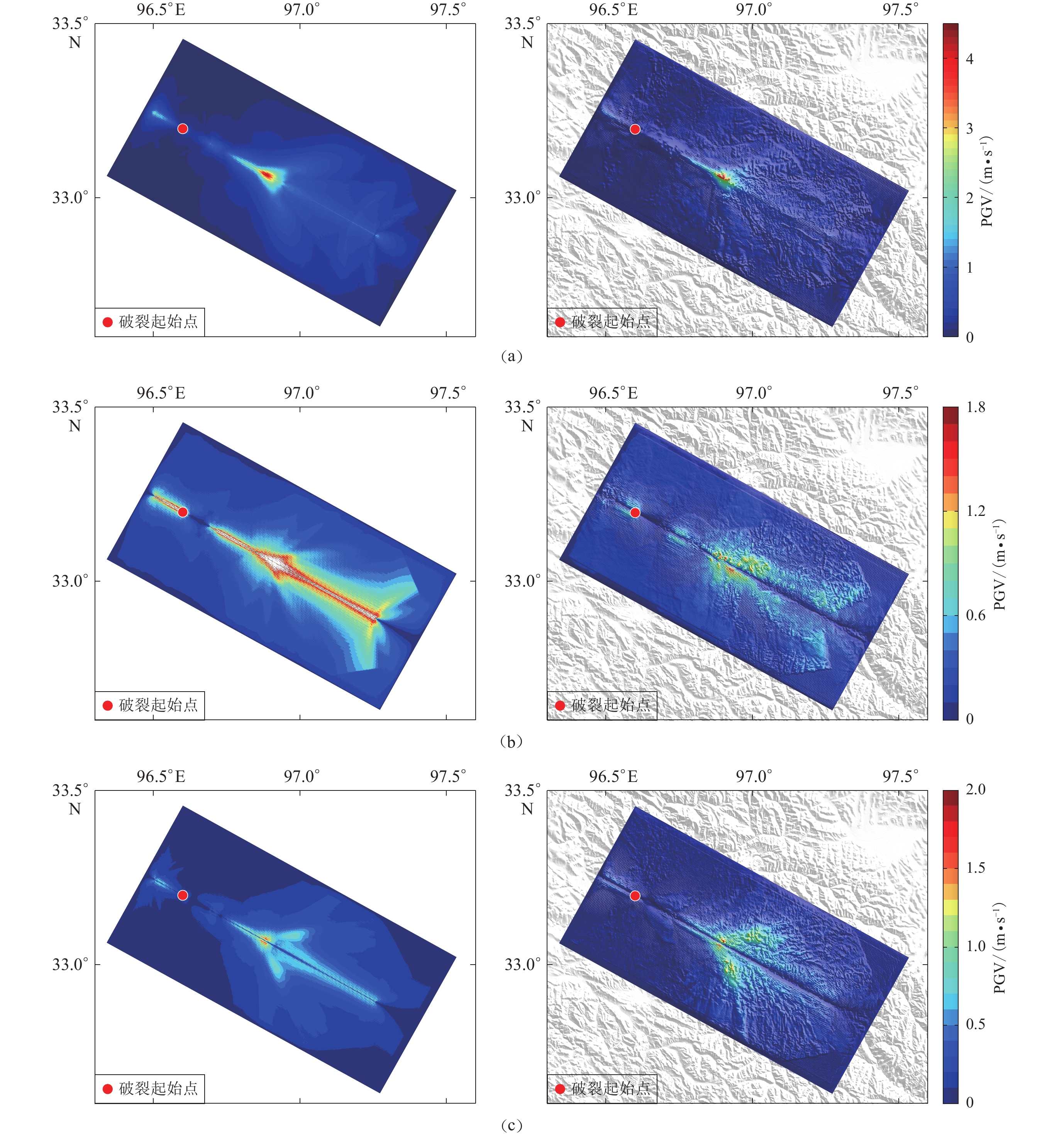
 下载:
下载:
